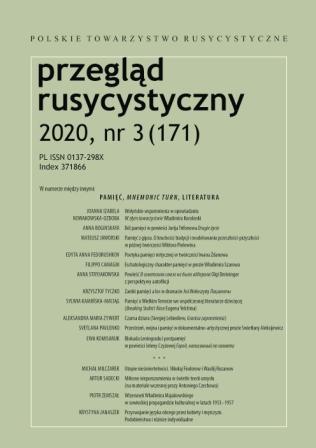Czarna dziura (Siergiej Lebiediew, Granica zapomnienia)
The black hole (Sergei Lebedev, Oblivion)
Author(s): Aleksandra ZywertSubject(s): Political history, Russian Literature, History of Communism, Theory of Literature, Politics of History/Memory, Sociology of Literature
Published by: Polskie Towarzystwo Rusycytyczne
Keywords: Sergey Lebedev; Oblivion; post-memory; trauma; labor camp;
Summary/Abstract: Sergei Lebedev’s novel entitled Oblivion (Предел забвения, 2010) belongs to the (highly important in the context of the post-memory literature) tradition of the so-called generational novel. On the example of the character-narrator’s story full of struggling to learn the true identity of his “grandfather” Lebedev shows that difficult and unprocessed memory amounts to an important up-to-date problem. It is so because in most contemporary Russian families the inconvenient facts from the past remain unvoiced (or the infamous relatives disappear from the family tree) due to overwhelming tabooing of mistakes and traumas. It is indicated that the general approval (sometimes even emphasized) of oblivion creates a hole in the youngest generation’s consciousness and strengthens the so-called repressive awareness. In this context the state of the Russian nation in the face of the conscious suppression of elements of its own history becomes a major issue.
Journal: Przegląd Rusycystyczny
- Issue Year: 2020
- Issue No: 171
- Page Range: 105-116
- Page Count: 12
- Language: Polish

